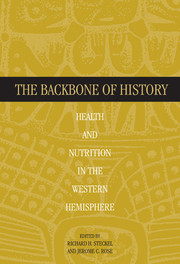Crossref Citations
This Book has been
cited by the following publications. This list is generated based on data provided by Crossref.
Pollard, Tessa M.
2001.
Western Diseases.
Steckel, Richard H.
Rose, Jerome C.
Spencer Larsen, Clark
and
Walker, Phillip L.
2002.
Skeletal health in the Western Hemisphere from 4000 B.C. to the present.
Evolutionary Anthropology: Issues, News, and Reviews,
Vol. 11,
Issue. 4,
p.
142.
Pruetz, Jill D.
2003.
Book reviews.
American Journal of Physical Anthropology,
Vol. 122,
Issue. 2,
p.
188.
Schweich, Marianne
and
Knüsel, Christopher
2003.
Bio-cultural effects in medieval populations.
Economics & Human Biology,
Vol. 1,
Issue. 3,
p.
367.
Berg, John C.
2003.
Reviews Editor's Introduction.
New Political Science,
Vol. 25,
Issue. 1,
p.
129.
Larsen, Clark Spencer
2003.
Animal Source Foods and Human Health during Evolution.
The Journal of Nutrition,
Vol. 133,
Issue. 11,
p.
3893S.
Komlos, John
and
Baten, Jörg
2004.
Looking Backward and Looking Forward.
Social Science History,
Vol. 28,
Issue. 2,
p.
191.
Floud, Roderick
2004.
The Origins of Anthropometric History.
Social Science History,
Vol. 28,
Issue. 2,
p.
337.
Engerman, Stanley L.
2004.
Personal Reflections on the 1982 Special Anthropometric Issue of Social Science History.
Social Science History,
Vol. 28,
Issue. 2,
p.
345.
Steckel, Richard H.
2004.
New Light on the “Dark Ages”.
Social Science History,
Vol. 28,
Issue. 2,
p.
211.
Newson, Linda A.
2005.
The Cambridge Economic History of Latin America.
p.
143.
Hartwick, John M.
2005.
Institutions, Sustainability, and Natural Resources.
p.
155.
Ousley, Stephen D.
Billeck, William T.
and
Hollinger, R. Eric
2005.
Federal Repatriation Legislation and the Role of Physical Anthropology in Repatriation.
American Journal of Physical Anthropology,
Vol. 128,
Issue. S41,
p.
2.
Stojanowski, Christopher M.
and
Buikstra, Jane E.
2005.
Research trends in human osteology: A content analysis of papers published in the American Journal of Physical Anthropology.
American Journal of Physical Anthropology,
Vol. 128,
Issue. 1,
p.
98.
Morris, Ian Peter
2005.
The Collapse and Regeneration of Complex Society in Greece, 1500-500 BC.
SSRN Electronic Journal,
Tayles, Nancy
and
Oxenham, Marc
2006.
Bioarchaeology of Southeast Asia.
p.
1.
Oxenham, Marc
and
Tayles, Nancy
2006.
Bioarchaeology of Southeast Asia.
p.
335.
Dapice, Ann N.
2006.
The Medicine Wheel.
Journal of Transcultural Nursing,
Vol. 17,
Issue. 3,
p.
251.
Pfeiffer, S.
and
Sealy, J.
2006.
Body size among Holocene foragers of the Cape Ecozone, southern Africa.
American Journal of Physical Anthropology,
Vol. 129,
Issue. 1,
p.
1.
Domett, Kate
and
Tayles, Nancy
2006.
Bioarchaeology of Southeast Asia.
p.
220.



